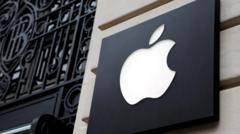Apple's noncompliance and alleged deceit under oath have prompted a potential criminal contempt inquiry.
Apple Faces Criminal Contempt Investigation Over Anti-Competitive Practices

Apple Faces Criminal Contempt Investigation Over Anti-Competitive Practices
A US judge has referred Apple to the US Attorney for investigation after finding the tech giant violated court orders in an Epic Games lawsuit.
In a significant legal setback for Apple, a US district judge has determined that the tech giant willfully disobeyed a court injunction stemming from a 2021 legal battle with Epic Games, the developer behind the immensely popular game Fortnite. Judge Yvonne Gonzalez Rogers has referred the case to the US Attorney for the Northern District of California, suggesting that a criminal contempt investigation may be warranted.
The injunction was designed to dismantle some of Apple's anti-competitive practices, specifically allowing developers more flexibility with payment options within the App Store. Apple has responded defiantly, announcing plans to appeal the decision while asserting they vehemently disagree with the ruling.
This latest judgement follows a lengthy litigation process initiated by Epic Games, which has long claimed that Apple's commission rates—up to 30% on in-app purchases—amounted to monopolistic practices. As part of her 2021 ruling, Judge Gonzalez Rogers mandated that Apple could not prevent developers from linking directly to external payment methods.
However, in a contempt ruling issued Wednesday, the judge found that Apple continued its anti-competitive behavior, stating that the company "will not be tolerated". Internal documents reviewed by the judge indicated that Apple was aware of its actions and intentionally opted for the most anti-competitive choices available. She highlighted that CEO Tim Cook ignored the advice of key executives like Phillip Schiller, who had advocated for compliance with the court order.
Judge Gonzalez Rogers did not hold back in her criticism, accusing Apple’s vice president of finance, Alex Roman, of lying under oath during the proceedings. Among the questionable practices was a move by Apple to impose a 27% commission on off-app purchases, a stark contrast to the previous policy of not charging for such transactions.
Epic Games' CEO, Tim Sweeney, took to social media to announce plans to reintroduce Fortnite to the iOS App Store and urged Apple to adopt a global framework eliminating the so-called "Apple Tax." He emphasized that no fees should apply to web transactions, framing this development as a major win not just in the US but also in Europe, where similar regulations are underway under the Digital Markets Act.
As the legal battles between the giant tech firm and gaming developers continue to unfold, the implications of this case could have far-reaching effects on the broader tech landscape.
The injunction was designed to dismantle some of Apple's anti-competitive practices, specifically allowing developers more flexibility with payment options within the App Store. Apple has responded defiantly, announcing plans to appeal the decision while asserting they vehemently disagree with the ruling.
This latest judgement follows a lengthy litigation process initiated by Epic Games, which has long claimed that Apple's commission rates—up to 30% on in-app purchases—amounted to monopolistic practices. As part of her 2021 ruling, Judge Gonzalez Rogers mandated that Apple could not prevent developers from linking directly to external payment methods.
However, in a contempt ruling issued Wednesday, the judge found that Apple continued its anti-competitive behavior, stating that the company "will not be tolerated". Internal documents reviewed by the judge indicated that Apple was aware of its actions and intentionally opted for the most anti-competitive choices available. She highlighted that CEO Tim Cook ignored the advice of key executives like Phillip Schiller, who had advocated for compliance with the court order.
Judge Gonzalez Rogers did not hold back in her criticism, accusing Apple’s vice president of finance, Alex Roman, of lying under oath during the proceedings. Among the questionable practices was a move by Apple to impose a 27% commission on off-app purchases, a stark contrast to the previous policy of not charging for such transactions.
Epic Games' CEO, Tim Sweeney, took to social media to announce plans to reintroduce Fortnite to the iOS App Store and urged Apple to adopt a global framework eliminating the so-called "Apple Tax." He emphasized that no fees should apply to web transactions, framing this development as a major win not just in the US but also in Europe, where similar regulations are underway under the Digital Markets Act.
As the legal battles between the giant tech firm and gaming developers continue to unfold, the implications of this case could have far-reaching effects on the broader tech landscape.





















